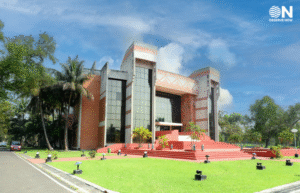India has always been a land of profound contrasts and remarkable achievements because of its ancient heritage and vibrant cultural diversity. Since gaining independence in 1947, the nation has embarked on an ambitious journey to transform itself from a post-colonial entity into a dynamic country. This vision, first articulated by Jawaharlal Nehru, aimed to establish a strong industrial base, invest in critical infrastructure, and advance scientific and technological innovation. Decades later, India stands at the cusp of realizing its dream of becoming a “Viksit Bharat” or a Developed India, with significant milestones marking its progress.
Riya Adlakha, Assistant Editor, ObserveNow interacted with industry leaders to get into the depth of the subject matter, knowing each industry’s contribution to the socio-economic development of the nation.
The IT Boom: A Global Transformation
One of the most significant milestones in India’s modern era is its rise as a global IT powerhouse. The IT revolution of the 1990s marked a dramatic shift, thrusting India into the spotlight of global technology.
Jayraj Vyas, Chief Technology Officer, Ola highlighted that, “In the 21st century, India stands at the forefront of the global IT revolution, transforming into a knowledge powerhouse. With IT services, e-commerce, and innovative software and hardware solutions, the IT industry is not just driving economic growth but also enhancing governance and empowering businesses to thrive in a competitive world.”
By 2024, the Indian IT sector is projected to reach $138.9 billion, up from $122.6 billion the previous year, reflecting a robust growth rate of 13.2%. Today, the sector, valued at over $200 billion, employs more than 4 million people. Renowned for its cost-effective and high-quality services, India’s IT industry is expected to grow at a compound annual growth rate (CAGR) of 7.5%, potentially hitting $350 billion by 2027. This growth underscores India’s pivotal role in the global technology landscape.
“Technology has been central to India’s journey from a newly independent nation to a global powerhouse. As India continues to embrace innovation and technological advancements, it is well on its way to becoming a truly developed nation —a Vikshit Bharat. As we progress towards a that goal, innovation continues to drive inclusive growth and empowerment”, said Abhijit Dey – Digital Banking and API Expert.
Advancements in Education and Healthcare
The higher education sector is poised for significant expansion, with a projected CAGR of 8.46% between 2024 and 2032, reaching a remarkable $225 billion by 2024–25. This growth highlights the sector’s responsiveness to modern educational trends, including online learning and EdTech innovations.
“Since Independence, India’s education system has advanced dramatically, with the Gross Enrollment Ratio in Higher Education rising from 0.70 to 28.4 and gender parity at 1.01. Despite this progress, government funding hasn’t met expectations, and the private sector now plays a crucial role in quality and innovation. As we face a demographic dividend, focusing on skill development and research is vital to preparing our youth for a global society, with India projected to supply 40% of the world’s employable population by 2040.” underscored Prof Sandeep Shastri, Director – Academics, Nitte Education Trust
Prof. Raghuvir Singh, Vice Chancellor, K. R. Mangalam University, Haryana underscored, “The purpose of education is two fold, One is to learn to earn a living, and the other is to learn to live. However, if a person learns to live, he/ she can definitely earn to live. Therefore, the focus of education should be on developing a good human with strong character, integrity, spirituality, and kindness.”
Education and healthcare have been central to India’s development story. The literacy rate is anticipated to reach 85.95% in 2024, with Kerala leading at an impressive 99.31%. Investment in education has fostered the rise of prestigious institutions such as the Indian Institutes of Technology (IITs) and Indian Institutes of Management (IIMs), cultivating a new generation of skilled professionals.
Vishal Anand, Pro Chancellor, Shoolini University said, “Indian education is at its sunrise point with edu tech becoming the norm along with skill education that will shape the country in the coming years. We have come a long way since independence but it’s time for us to fly.”
“Come On My Bharat, Bash On Regardless. The Peak is Within Reach”, Maj. Gen. B.D. Wadhwa, Pro-Chancellor, IILM University highlighted in a statement.
In healthcare, initiatives like the National Rural Health Mission and the Ayushman Bharat scheme have made substantial strides in improving medical access and reducing health disparities. The Union Health Ministry’s allocation of Rs 90,658.63 crore in the 2024-2025 Budget marks a notable 12.59% increase in healthcare spending. The Ayushman Bharat Digital Mission aims to establish an integrated digital health infrastructure, enhancing accessibility and empowering individuals with comprehensive health information.
Startup Surge
India’s startup ecosystem has experienced unprecedented growth, emerging as the world’s third-largest hub for startups. With over 125,000 startups and 110 unicorns, the entrepreneurial landscape is bustling with innovation. These startups employ more than 1.2 million people and have secured over 12,000 patents. Initiatives such as Startup India and the Atal Innovation Mission are driving this success, fostering a culture of entrepreneurship that extends beyond major metropolitan areas.
“India’s startup ecosystem, a crucible of digital alchemy, is forging a new path. Armed with the quartet of AI, blockchain, engineering and digitization, these catalysts are not merely transforming businesses but are societal architects, as well. Transforming challenges into innovations, they are scripting India’s destiny as a global innovation powerhouse. Their collective brilliance positions India as the world’s innovation foundry, casting a promising future for generations to come !”, highlighted Abhishek dutta Global Director- Data Science & Consulting-Affine
Space Exploration
India’s achievements in space exploration are equally impressive. The space sector is projected to reach $13 billion by 2025, with ambitions to capture 10% of the global space economy by 2030. From a solitary startup in 2012, the space industry now features 189 startups, with funding for these ventures growing significantly to $124.7 million in 2023. The Space Policy 2023 embodies India’s forward-thinking vision for a robust space ecosystem, highlighting the crucial role of the private sector in this burgeoning field.
Social and Cultural Progress
The evolution of India’s ecosystem is increasingly inclusive, with women taking on prominent roles as entrepreneurs and leaders. Programs such as the Women Entrepreneurship Platform are bridging gender gaps and driving economic growth. Women now represent a significant portion of the startup landscape, contributing to a more diverse and dynamic business environment.
“Diversity is a blessing and inclusivity is kindness to be a part of every business and non- business activities. Women, in particular, lead with empathy for people that enables differentiating growth trajectory across all the segments”, said Namita Patwari, Chief Human Resources Officer, Alembic Pharmaceuticals
Women are entering the workforce in greater numbers, notably, 15% of startups are unicorns founded by women, and ventures with female founders raised $74 million in January 2024. 11% of seed funding goes to startups with women on their founding teams.18-20% of startups in India are owned by women. 18-20% of unicorns have women as co founders. As women’s participation in paid work grows, addressing employment quality and investing in supportive infrastructure will be crucial for narrowing gender disparities.
Devyani Mehra, Intel India HR Director emphasised, “This Independence Day, as we celebrate the progress of women achieving over 20% of leadership roles in top companies, let us also recognize the challenges that persist. True freedom is not just about celebrating milestones but committing to overcoming gender pay gaps and amplifying representation for women in marginalized communities. Let us pledge to advance gender equality by supporting initiatives that drive women’s leadership, safety, and representation, ensuring every woman can reach her full potential and contribute equally to our nation’s growth.”
Looking Ahead to 2047
As India charts its course toward 2047, the vision of becoming a Viksit Bharat is within reach.
India stands on the brink of a new era, with the potential to realize its vision of a developed, inclusive, and empowered nation. Achieving the dream of Viksit Bharat by 2047 requires unwavering dedication and collaborative effort from every sector of society.
Together, we can transform this vision into a vibrant reality!
























